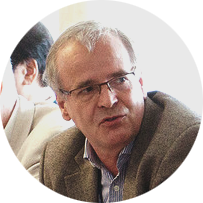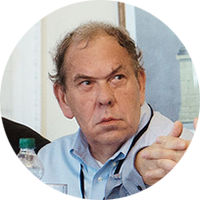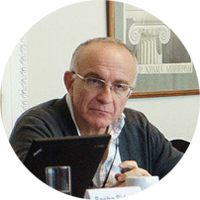Taking Education from the 19th Century to the 21st
For the first time ever, the leaders of education studies centres from some of the world’s leading research universities met at the HSE Academic Centre in Pushkin, Russia. At the meeting, the researchers, along with a representative from OECD, discussed how education studies departments should change to meet the global challenges that face the sphere of education.
The meeting was held on the initiative of the HSE Institute of Education and the Graduate School of Education at Peking University with the support of the Harvard Graduate School of Education. The seminar saw the participation of 22 former and current deans from 19 universities around the world. Participants came from 14 countries and five continents to attend. These meetings are now planned to take place on a regular basis, and the next deans’ summit will take place in Beijing in 2017.
Participants agreed to create a global network of education studies centres. This will make it possible for professor and graduate student exchanges to take place and will also stimulate active discussions in the education studies community. In addition, new research opportunities will open up, as such a network allows for a global agenda to be created for new fields of study.
There have generally been several global trends in the development of education – increased accessibility, new technology, innovative forms of distance learning, and the ability to adapt to the changing labour market. It is critical that the world’s leading education studies centres join together and share best practices. Participants of the seminar are hoping that the network they have created does a good job of tackling this task.
We asked some of the seminar’s participants about the main challenges that the field of education currently faces.

Andrew Brown, Interim Director of Institute of Education, University College London
One set of challenges in education would be around the changing nature of work, the labour market, on how you prepare people for the changing labour market, a barbell labour market, when on the one end you have a demand for highly-skilled workers, and on the other end more routine forms of work with a very thin and slim bit in the middle of decreasing demand for people with middle-level skills, knowledge and understanding. So how do we insure that all students have an opportunity to thrive in a changing environment? I think there is a lack of stability, with people doing portfolio type work, when they do lots of types of things. How are we going to prepare people for that type of working environment?
Technology provides challenges for current teachers and students: how to make the best use of technology, how do we prepare people for technology-rich environment, how to make the best use of technology in our teaching and learning and then again transform the nature of teaching and learning because the type of knowledge that is needed is changing and the type of skills that you need to have changes. Are teachers best prepared to induct students into this technology-rich environment? How do we prepare teachers in order to prepare students? So it’s a chain of different challenges relating to technology. Those things relate to21st century skills that people need. What are those skills and how to develop them?
For me, I suppose, it’s also the challenges around the access to the principles of production of knowledge, so that we’re going to say that we are in a knowledge-based economy: who creates new knowledge, how do they create it, how do we prepare people to be able to understand the principles of production of knowledge. You are not just giving people knowledge as a commodity, which is perishable. If you have useful knowledge and the landscape changes, the knowledge become redundant and you have to produce new knowledge in a new environment.
Diversity is a challenge. I mean diversity in terms of social class, culture, economic circumstances, geographic diversity etc. In every increasingly rich and diverse society how do you create opportunities for all those people? How do you prepare people to live in this increasingly diverse society? The challenges are for everybody. Wherever you are in the system you have to deal with these challenges.

Arthur Levine, President of Woodrow Wilson Foundation, former President of Teachers College, Columbia University
This is a period of transition. This is the time of dramatic change across the globe, and it’s happening demographically, economically, technologically and globally. We have the challenge of preparing our children for a new society, for the new world. So we have agendas that are left over from preparing people for national industrial economy, we haven’t reached this in many countries, we haven’t reached the poorest of our children. We can’t provide equal opportunity for them: they don’t do as well in terms of mobility, they don’t do as well in terms of the future. That’s an agenda we’ve always had and we’re yet to meet it. They will be exacerbated by all the changes that are going now. And then we have the challenge of preparing students, the children, for the world in transition, the world that’s going to be different than the world of their teachers, parents and others. And then in terms of education we have enormous challenges in terms of the cost, the effectiveness, the standards by which we know whether it’s working or not working.
There is a number of things that is critical for facing these challenges. One is strong research – we need to understand the dimensions of the problems and the interventions that work and make a difference. Secondly, we need human capital, we need people who choose to work in these fields and want to work in these fields. In a number of countries education is not a very prestigious profession to go into. So we need to attract the best and we need to attract them at all levels. The third thing that we need is money. These things do not come free. And I guess the forth I would choose is the networks. If we are going to make it better, we need practitioners, and people who prepare them.

Dirk Van Damme, Head of the Innovation and Measuring Progress Division (IMEP) in the OECD Directorate for Education and Skills
The value proposition of this meeting was how we can strengthen the position of educational schools, the quality of education research, the international networking in research and educational schools. I definitely think that we need to strengthen education by improving the quality of research and also the collaboration among the schools of education, because we are still operating a little bit in the 19th century kind of mode, and there are so many challenges in education and teacher training and improving the quality of teachers, that we have to put together our efforts, knowledge and experience in order to do better.
It is the first meeting we did explore some of the issues, we are just scratching the surface, and I am hesitant to jump to the conclusions a bit too rapidly, but it could be the first of the series of meetings. We have very interesting group of people from leading schools of education around the world. And we are in the capacity of defining the issues slowly, maybe formulating some possible solutions to them. So let’s not try to find solutions to the problems we haven’t defined well.

Patricia Albjerg Graham, Charles Warren Professor of the History of American Education, Emerita, Harvard Graduate School of Education
I can only speak about my country, the USA, and I would say that the main challenge we face is to hope that all of our children receive excellent education. Many of our children are getting excellent education now. But there is an important group of children, particularly children who live in low-income families and children whose opportunities are not as great as wealthy children, some of them are not getting good education now and we must correct that. In the USA we have a very significant disparity between what families spend on their children’s education. Wealthy families provide best enrichment for their youngsters. Whereas families that are not wealthy are not able to do that.
Furthermore, children who live in wealthy families live in communities that have vast resources of libraries, museums, sport facilities and so on. Whereas children who do not live in affluent communities do not have these opportunities. And the issue is that with every child you need to get them excited and enthusiastic about learning things. Some children will become very enthusiastic about arts, for others it may be science experiments, for others it may be some kinds of athletic activities, but they all need to have these supplementary activities besides what the school does to provide them with the intellectual nourishment that they need. As for solving these problems, I think it’s a combination: family action, community action and government resources (local, state and federal). It’s a combination of government and private resources to benefit all children.

Isak Froumin, Academic Supervisor of HSE Institute of Education
There are three main challenges that will determine the fate of education, and these are the challenges that politicians and managers should be focusing on.
The first challenge is expanding education at all levels, and this includes turning higher education into universal education. This means that our task should be to educate those who do not have enough motivation or enough preparation. This will require an increased level of motivation, the formation of ‘reaching’ practices, and a ‘second chance’ policy. Even today, 30% of Finnish schoolchildren receive individual support to help them overcome any difficulties they’re having with school. And this percentage will only increase.
The second challenge is growing inequality, which is connected with the increased prevalence of preschool and non-formal education on the one hand, and the ‘edutainment’ sphere on the other. It is specifically there that soft skills are formed, and these skills play such an important role in a person’s future success. Undereducated and poorer families not only lack the financial means needed to utilize this field, but they lack the cultural resources as well. This is one way in which making educational opportunities more expensive leads to increased inequality.
The third and final challenge concerns technology. The technological revolution has shown that education is somewhat behind as far as technology is concerned, especially compared to different fields such as healthcare. In addition, the tech revolution is creating a cultural gap between the generations, a gap in which older individuals are less capable of navigating the new technological environment than the younger generation.
See also:
HSE University Represents Russia at Leading International Educational Exhibition APAIE
HSE University was the only participant from Russia to hold its own expert sessions at the annual conference and exhibition of the Asia-Pacific Association for International Education (APAIE). The delegation was headed by Anna Tyshetskaya, Director of HSE University–St Petersburg.
'You Find Yourself Thinking about Your Research 24/7'
Daria Gracheva, expert at the Institute of Education, turned to science in pursuit of methods to discern between a poorly constructed test and a well-designed one. In this interview with the HSE Young Scientists project, she discusses the '4K test,' which is intended to measure critical thinking and communication skills, shares insights on the model named after Georg Rasch, and explains how setting up an aquarium for a crab can help assess soft skills.
HSE University-St Petersburg Represents Russia at International Conference in Australia
The delegation of HSE University-St Petersburg participated in the largest educational forum-exhibition of the Asia-Pacific Association for International Education 'APAIE 2024'. The 20th anniversary conference was held in the Australian city of Perth.
Inverse Relationship Found between Propensity to Innovate and Academic Success
Mariia Evdokimova and Anastasia Stepanova, employees of HSE University’s Faculty of Economic Sciences, studied the connection between students’ personal characteristics and their desire to create something new. The researchers have found that students’ propensity to innovate lowers their GPA. The results of the work were published in the preprint ‘Students’ Propensity to Innovate: Correlates, Determinants, and Impact on GPA.’
Social Connections Help Women Achieve Academic Success
Social integration has different effects on the academic achievement of women and men. Researchers from HSE University’s Institute of Education studied the connections between academic performance and social integration among 4,500 young Russians. It turned out that this connection is much stronger than it might seem at first glance, and that it is more important for women. The results of the work were published in the Journal of Social and Personal Relationships.
A University's Special Status Is Correlated with a Substantial Increase in Salaries for Graduates
A university education is a highly sought-after commodity in Russia, yet the quality of universities and their programmes varies significantly. This gives rise to risks of inequality, both in the realm of education and in the labour market, and subsequently impacts the returns on higher education, which are manifested in the salaries earned by graduates. According to a study by Ilya Prakhov, Assistant Professor of the HSE Faculty of Economic Sciences, graduates from Russia’s top-tier universities enjoy a distinct advantage. The paper has been published in the International Journal of Educational Development.
HSE University and Moscow Planetarium Sign Cooperation Agreement
The parties will work to popularise science and conduct educational and research activities, including in the fields of astronomy, cosmonautics, and Earth science. The agreement also covers the implementation of joint practical programmes and internships for students.
HSE University and Agency for Strategic Initiatives Sign Cooperation Agreement
HSE University and the Agency for Strategic Initiatives (ASI) have agreed to cooperate in the development of new technologies, the digital transformation of the economy, and the social development of the country. The agreement was signed by HSE University Rector Nikita Anisimov and ASI Director General Svetlana Chupsheva at the St Petersburg International Economic Forum.
Basic, General, and Home-based: Why Families Choose to Homeschool and What Challenges They Face in Doing So
There are many reasons why families choose to homeschool their children, from wishing to personalise their education to protecting them from bullying to strengthening the family bond. Those who decide to switch to homeschooling can face quite a few challenges, both logistical and psychological, including criticism from family members. IQ.HSE presents a few facts on homeschooling in Russia based on a paper by researchers of the HSE Institute of Education.
Card Index: Uberisation of Education
Education is in the process of being partly reformatted into an on-demand service, with digital platforms quickly and efficiently matching teachers to students. This can make education more personalised and accessible and open up new professional development and money-making opportunities for teachers. But is an Uber-like model really good for education? The following discussion of uberisation in education is based on a paper by philosopher Timur Khusyainov, Deputy Dean of the Faculty of Humanities at the HSE Campus in Nizhny Novgorod.


